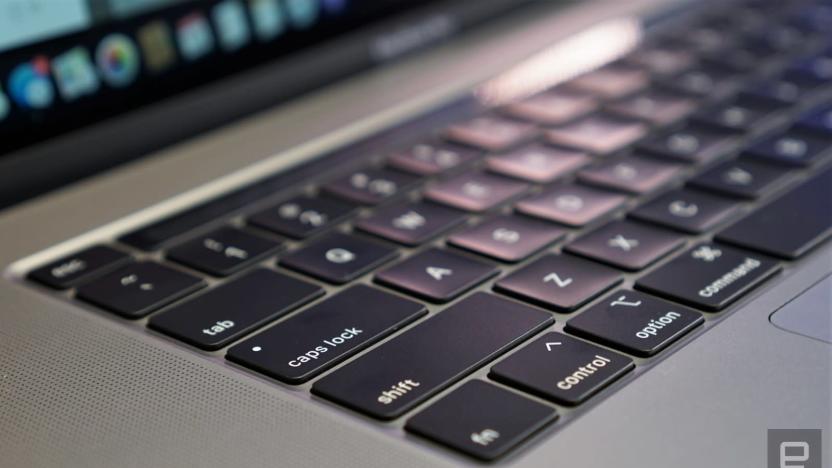ecc
Latest

Apple's next MacBook upgrades could be coming soon
Last year's 16-inch MacBook Pro felt a bit like a return to form. While the latest iteration of Apple's flagship laptop didn't address the love-it-or-hate-it (but mostly hate-it) Touch Bar and an obnoxious lack of connectivity, it did have a much better keyboard compared to previous models. The new MacBook Pro replaced finicky butterfly switch keys with new mechanisms that make typing feel more natural and are more resilient to dust and debris. Naturally, one question on Mac users' minds was when Apple would bring the new scissor-switch-equipped keyboard to the 13-inch MacBook Pro and the MacBook Air lineup. According to 9to5Mac, a new filing with the Eurasian Economic Commission (the ECC) indicates that we could see the more ergonomic notebooks sooner rather than later.

LSU's bendable concrete could fix America's crumbling infrastructure
America's infrastructure is crumbling around us. The American Society of Civil Engineers' latest Infrastructure Report Card, from 2017, rated the nation's roads, bridges, airports and water systems at a paltry D+ -- the same grade received four years prior when the report card was last issued. However, recent advances in a novel form of concrete could help us rebuild our roadways to be stronger and more resilient than ever before.

HP readying competitor for Amazon's cloud computing, plans to launch soon
We're still waiting to see where HP goes with webOS, but according to the New York Times it will officially launch a cloud computing service that competes with Amazon Web Services in the next couple of months. HP Senior VP and General Manager Zorawar Singh is quoted saying the currently in beta service projects as an alternative to what Amazon has built with a focus on personalized sales and service and additional tools for third party developers, as well as a system of small data centers around the world. Throw in analytics based on technology it's obtained by purchasing Vertica and Autonomy, and maybe Meg Whitman's ship has something here, but we'll wait until the next Netflix is running its operations from this cloud before declaring it on the same level.

Kingmax flaunts world's first 64GB microSD card
In case you'd forgotten (and who could blame you), Kingmax used to have a thing for setting small records -- even if it meant one-upping itself. Four years later, the king is back and he brought a 64GB microSDXC card with him; the world's first, wouldn't you know? If history repeats itself, we can expect similarly sized storage from SanDisk and other manufacturers soon. We love passing storage milestones, but don't get too excited: only a handful of devices currently have the architecture to support microSD cards bigger than 32GB, so make sure you have a compatible device before you empty your wallet. Don't have one? Don't sweat it; there's no word yet when the new cards will be available, so you have plenty of time to upgrade. Head past the break to check out the press release.

Micron embeds error correction in flash memory chips, calls it ClearNAND
Solid state storage is fantastic stuff, durable and lightning-quick, but it's got its fair share of quirks -- bits fail, pages fill up, and cells deteriorate over time. Typically, the onus is on a beefy controller to take care of your drive and make sure it lasts a good long while (which is why brand names like SandForce can make or break an SSD) but it looks like Micron is planning to usurp some of that responsibility with its new ClearNAND chips. Simply put, each ClearNAND memory module has a built-in 24-bit error correction engine, so your drive's host controller doesn't have to shoulder that load, and can focus on the good stuff -- like getting your data delivered at speeds that would obliterate traditional hard drives. Micron says the new chips are available right now in 25nm sizes. Want a more technical rundown? Hit up our more coverage link to hear what this might mean for the error-prone future of the medium. PR after the break.

(You can't get no) SATAsfaction 6Gbps SSDs (yet)
Enterprise solid state drives aren't typically our foray, but when they support SATA 6G, we pay attention. It also doesn't hurt when they sport a fantastic name. The SATAsfaction drives from Accelerated Memory Production (AMP) have both Sandforce controllers and the speedy ports to match, alongside 12 byte per sector ECC error correction and TRIM support. Still, they're not the fastest SSDs around, clocking in at only 260MB / sec reads and 150MB / sec writes, but they do have SLC flash memory for likely higher reliability than the current speed demon. No pricing or availability yet, but SLC NAND is pretty expensive stuff... so unless you're buying for a corporation with a large bankroll, better count on waiting for the cheaper Devo version.

Microsoft in 'open dialogue' with ECC over disc scratching concerns
It's been one week since European Commissioner for Consumers Meglena Kuneva requested information from Microsoft on the Xbox 360 disc scratching problems highlighted by an investigation by Dutch TV show Kassa. The company released a statement saying that they "are working in an open dialogue with Commissioner Kuneva to clarify our position and all the efforts we are taking across the EU, and in fact globally, to address any consumer concerns." However, as 1UP notes, Microsoft released a separate statement to MCV that has since been amended. That statement placed the blame on "improper use" of the Xbox 360, which involves moving the console while a disc is inside. Kassa's own report indicates that the scratching can occur if the console is switched from horizontal to vertical position, so though the user may be at fault, is the policy therefore unfair? Microsoft did retract this statement; it's unclear if they did so due to a change of heart or because implying consumer fault is just bad PR. The statement went on to say, "As we have said previously, there is no widespread issue regarding scratched discs as is alleged by Kassa." That's a far cry from the statistical data we were hoping to see, and the subjectivity of the word "widespread" leaves Microsoft a rather large window for problems. We hope to hear more as the public investigation continues.

Transcend joins the party, intros 32GB SSD drive
Shortly after releasing a 16GB SSD for ExpressCard slots, Transcend is joining SanDisk and TDK (among others) in the cost-effective 32GB arena. The company's 32GB 2.5-inch IDE solid state disc sports a "tough outer metal case," anti-shock features, "no moving parts," and the lower power consumption we've come to expect from these guys. The drive clocks in at just 7.4-millimeters thick and even touts built-in ECC (Error Correction Code) functionality that purportedly "ensures highly reliable data transfer and increases your systems energy efficiency." Unfortunately, the firm hasn't divulged details just yet around pricing, but we do know that an 8GB (TS8GSSD25) and 16GB (TS16GSSD25) flavor will be sitting alongside the 32GB TS32GSSD25 right about now.[Via PCLaunches]

Digital cameras save little kids' teeth
Here at Engadget, we're all for preventive medicine. In fact, we're all about preventive anything, unless it's stopping us from getting our hands on the latest gear. Anyway, it turns out that there's a fairly treatable dental disorder called "early childhood dental caries," known in the biz as ECC. Sometimes when babies or toddlers go to sleep with a bottle of juice in their mouth, the sugars from the juice can cause serious dental problems, including tooth decay, sometimes leading to extraction. Ouch. Or to put it in terms that will make your wallet say "ow," annual treatment costs in the community of Rochester, NY, a town of over 200,000, run into the nabe of $1 million. Fortunately for them (and hopefully soon, the rest of us), University of Rochester Medical Center dental researchers have come up with a way of severly reducing this problem before it starts. By taking digital pictures of these tykes' teeth at health clinics and then zipping them off to pediatric dentists at the Eastman Dental Center across town, the problem can be spotted before it gets out of control. There, dentists check out the photos, can diagnose ECC and recommend treatment as needed. If only all dentistry was this easy. But seriously folks, if you really want to save money, try outsourcing your dental photography to India.[Via medGadget]




